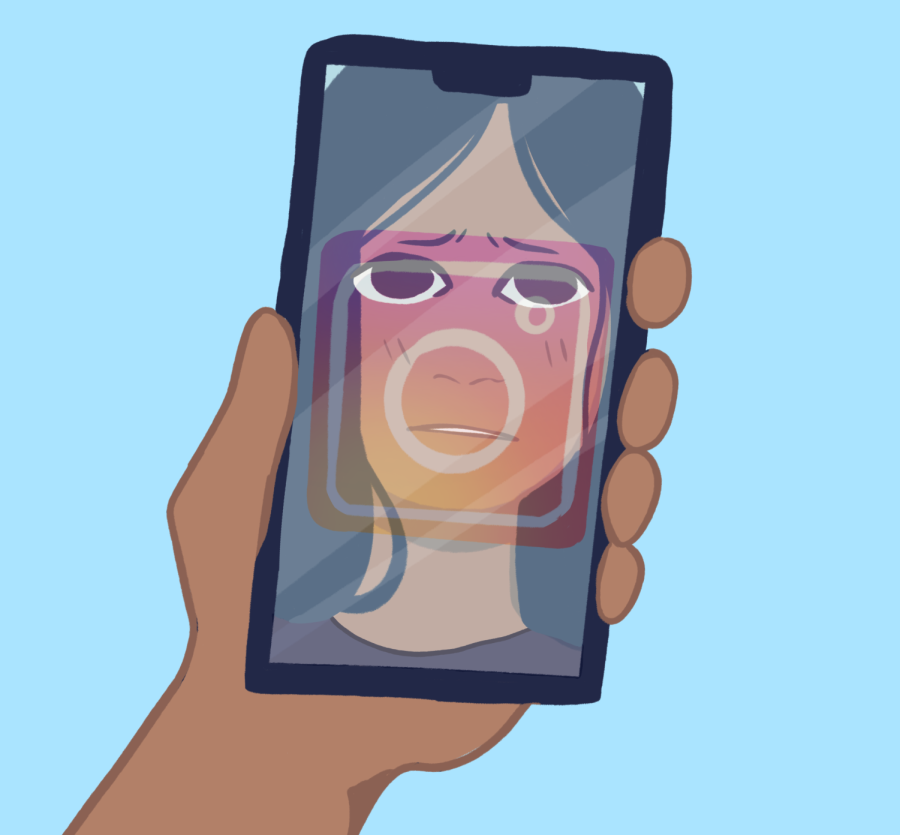Students say social media causes negative body image, eating disorders
February 21, 2022
As social media usage continues to increase, more people find themselves regularly scrolling through apps such as TikTok and Instagram. Arianna Mendez, freshman in ACES, said she often compares herself to the content she sees on social media platforms.
“I’m taking care of myself both physically and mentally, but I can’t help but look at these videos and pictures,” Mendez said. “And there’s a part of me that’s saying, ‘Why can’t I look like that?’”
For people of all ages, social media can cause individuals to have a negative body image and even eating disorders. According to a study by Florida House Experience Health, 87% of women and 65% of men compare themselves to others on social media.
Gari Matsey, site director of The Renfrew Center for Eating Disorders’ Chicago branch — a treatment center specializing in individual eating disorder recovery—, explained that comparing oneself to people on social media is harmful. She said that social media does not accurately represent people.
“Social media presents individuals in a way that is not their authentic self,” Matsey said. “It gives people something to compare themselves to that they will never be able to live up to or match.”
Get The Daily Illini in your inbox!
Mendez echoed this statement, saying that the beauty standards created by social media are impossible to achieve.
“A lot of times, I don’t even feel like what a woman should look like,” Mendez said.
Mendez further explained that pictures posted on social media are likely edited and taken in ways that only show people at their best. She said that through the use of filters, posing, lighting, camera angles and even photo editing software, the image that gets posted does not represent a person’s true self.
“You just have to constantly remind yourself that this is not real,” Mendez said. “Humans are all beautiful, in all shapes and sizes.”
Olivia Benge, senior in LAS and FAA, explained that she has experienced the negative effects of social media herself.
“I had disordered eating for a really long time, and I still kind of struggle with it,” Benge said. “It’s definitely been influenced by social media.”
Benge further explained that in addition to creating issues with body image and eating disorders, social media can also worsen a person’s preexisting negative body image.
Benge and Mendez both said they found TikTok to be more potentially harmful than other social media sites.
“There are some situations where it’s impossible to avoid certain things, especially with TikTok,” Benge said. “You don’t really control your For You page, which can be problematic because you can accidentally run into things.”
Mendez explained that given social media’s massive reach, she is concerned with how children interact with it.
“Kids are not being able to live their childhood anymore because they’re trying to achieve this perfect standard,” Mendez said. “You’re having kids worry so much about their appearance and how they seem to other people that they can’t be kids anymore.”
Through the implementation of likes and followers, social media sites influence one to present themselves in a specific way in order to get higher numbers. Benge explained the issues she sees with this system.
“Having images tied to a numerical value can really screw up not only body image but also personal insecurities,” Benge said. “You’re constantly associating your value with a number, whether it’s your weight, the like number, everything becomes a statistic.”
Becky Mehr, director of outpatient nutrition at The Renfrew Center, explained the importance of avoiding this approach to social media.
“Remind yourself that engagement on social media platforms doesn’t define us or our worth or value,” Mehr said. “There are a lot more things to ourselves than just what we’re seeing or engaging with on social media platforms.”
Matsey explained the importance of developing a support group and finding people who have similar experiences. She explained that eating disorders are the most harmful in isolation and that it is important to remember no one is alone in their struggles.
Benge explained that she thinks these issues can’t be solved through the internet alone.
“A lot of it has to be done outside of the internet, educating people earlier, providing non-judgmental help and intervening early on,” Benge said. “Provide help that is accessible to younger people.”
As part of the upcoming National Eating Disorder Awareness Week, The Renfrew Center is providing free resources and events to college students aimed at providing support and education about eating disorders. The calendar of events can be found on their website.
Matsey and Mehr both explained the importance of spreading awareness about eating disorders in order to provide better help and understanding.
“It starts with having the conversations,” Matsey said. “People can’t talk about an issue if they don’t know it’s an issue.”







